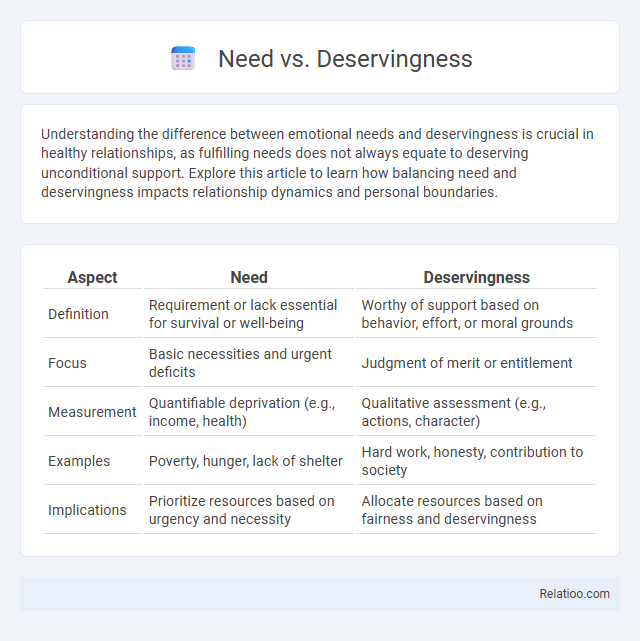Understanding the difference between emotional needs and deservingness is crucial in healthy relationships, as fulfilling needs does not always equate to deserving unconditional support. Explore this article to learn how balancing need and deservingness impacts relationship dynamics and personal boundaries.
Table of Comparison
| Aspect | Need | Deservingness |
|---|---|---|
| Definition | Requirement or lack essential for survival or well-being | Worthy of support based on behavior, effort, or moral grounds |
| Focus | Basic necessities and urgent deficits | Judgment of merit or entitlement |
| Measurement | Quantifiable deprivation (e.g., income, health) | Qualitative assessment (e.g., actions, character) |
| Examples | Poverty, hunger, lack of shelter | Hard work, honesty, contribution to society |
| Implications | Prioritize resources based on urgency and necessity | Allocate resources based on fairness and deservingness |
Understanding the Concepts: Need and Deservingness
Need refers to the essential requirements individuals must fulfill to achieve a basic standard of living, encompassing necessities like food, shelter, and healthcare. Deservingness is a subjective evaluation often based on moral or social criteria, determining who merits assistance or resources due to their behavior, effort, or contribution. Understanding the distinction between need and deservingness is critical in policy-making and social welfare, influencing how support is allocated and justified.
Historical Perspectives on Need and Deservingness
Historical perspectives on need and deservingness have shaped social welfare policies by distinguishing between those deemed truly in need and those considered worthy of aid based on moral or social criteria. Early welfare systems in the 19th and early 20th centuries often linked deservingness to behaviors such as work ethic and family structure, reflecting societal values and biases of the time. This differentiation influenced the allocation of resources, where assistance was commonly limited to individuals perceived as deserving, reinforcing social hierarchies and stigma around poverty.
Psychological Foundations of Deservingness
Psychological foundations of deservingness reveal how individuals assess merit based on fairness, social norms, and moral judgments, which can differ significantly from objective needs. Your perception of deservingness is often influenced by cognitive biases, emotional responses, and social comparisons that shape whether you view someone as genuinely entitled to resources or recognition. Understanding these psychological processes helps clarify why people often prioritize deservingness over mere need in allocating support and rewards.
Social Dynamics of Need-Based Policies
Social dynamics in need-based policies often reflect tensions between perceived need and deservedness, shaping public attitudes toward welfare distribution. Studies reveal that individuals deemed deserving--such as disabled or elderly populations--receive more supportive responses than those seen as merely needy, influencing policy design and implementation. This interplay affects resource allocation efficiency and social cohesion by aligning assistance with societal values and biases.
The Ethics of Distributing Resources: Needs vs Deserts
The ethics of distributing resources pivot on the distinction between need and deservingness, where need refers to the essential requirements for well-being, and deservingness focuses on merit or contribution. Your decision in resource allocation reflects the ethical principle you prioritize, balancing compassion for those in need against fairness to those deemed deserving based on effort or achievement. This ethical tension influences social policies, shaping how societies address equity, justice, and support for vulnerable populations.
Impact on Welfare Systems and Social Benefits
Need, deservingness, and entitlement influence welfare systems by determining eligibility and the distribution of social benefits. Policies based on need prioritize individuals facing economic hardship, while deservingness often incorporates moral judgments about recipients' behavior or circumstances, affecting public support and resource allocation. Understanding these distinctions helps you navigate and advocate for fair access to social safety nets that balance compassion with accountability.
Cultural Views on Deservingness Across Societies
Cultural views on deservingness vary widely, influencing social policies and resource distribution in different societies. Collectivist cultures often emphasize group needs and social harmony, prioritizing communal deservingness over individual achievement. In contrast, individualistic societies tend to link deservingness to personal effort and merit, shaping welfare systems that reward self-reliance and productivity.
Economic Implications: Allocating by Need or Merit
Allocating resources based on need prioritizes equity, aiming to reduce socioeconomic disparities by directing aid to the most vulnerable populations, which can promote social stability and inclusive growth. In contrast, merit-based allocation incentivizes productivity and innovation by rewarding individuals or entities according to their contributions or achievements, potentially enhancing economic efficiency. Balancing these approaches involves weighing immediate social welfare benefits against long-term economic incentives, shaping policy decisions in welfare, taxation, and public funding.
Criticisms and Controversies Surrounding Deservingness
Criticisms surrounding deservingness emphasize its subjective nature, often reflecting societal biases and perpetuating inequality by unfairly judging who merits support based on moral or behavioral criteria. You may encounter controversies when policies exclude individuals deemed "undeserving," ignoring systemic barriers and reinforcing stigmatization. Scholars argue that focusing on need rather than deservingness promotes equity and human dignity by prioritizing assistance based on vulnerability rather than perceived merit.
Moving Forward: Balancing Need and Deservingness in Policy
Balancing need and deservingness in policy is crucial for creating fair and effective social programs that prioritize both equity and motivation. Policymakers must carefully evaluate criteria that address immediate necessities while ensuring resources are allocated to those who have demonstrable merit or efforts that justify support. Your understanding of this balance enhances advocacy for policies that promote sustainable support systems fostering long-term independence and social equity.

Infographic: Need vs Deservingness
 relatioo.com
relatioo.com